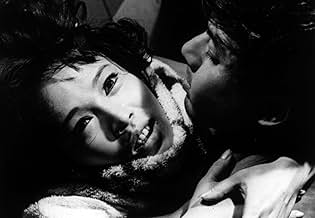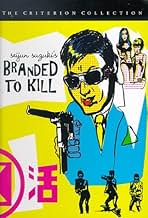After a botched assignment, a rice-fetishizing hitman finds himself in conflict with his organization, and one mysterious, dangerous fellow-hitman in particular.After a botched assignment, a rice-fetishizing hitman finds himself in conflict with his organization, and one mysterious, dangerous fellow-hitman in particular.After a botched assignment, a rice-fetishizing hitman finds himself in conflict with his organization, and one mysterious, dangerous fellow-hitman in particular.
- Awards
- 1 win
Jô Shishido
- Gorô Hanada
- (as Joe Shishido)
Annu Mari
- Misako Nakajô
- (as Anne Mari)
Akira Hisamatsu
- Ophthalmologist
- (as Kôsuke Hisamatsu)
Kôji Seyama
- Restaurant Guest
- (as Takashi Seyama)
Storyline
Did you know
- TriviaWhen Nikkatsu studio executives saw the finished product, they thought it was too terrible to be released, so they shelved it. Seijun Suzuki along with others in the film business, film critics, and students protested in unfairness since, by contract, Nikkatsu was supposed to release the finished film theatrically. It went to court, with a ruling in favor of the director. Nikkatsu had to pay for damages and have the film released. Suzuki's contract with Nikkatsu was terminated, and with the bad reputation, was unable to work on a feature film for the next 10 years.
- ConnectionsFeatured in Seijun Suzuki | TCM (2013)
- SoundtracksKoroshi no buruusu (Killing Blues)
Lyrics by Hachiro Guryu (Yasuaki Hangai, Takeo Kimura, Okada Yutaka, Chûsei Sone, Seijun Suzuki, Yôzô Tanaka, Seiichiro Yamaguchi and Atsushi Yamatoya)
Music by Kagehisa Kusui
Sung by Atsushi Yamatoya
Featured review
The number-three-ranked hit-man (who makes these rankings?), with a fetish for sniffing boiling rice, fumbles his latest job, which puts him into conflict with a mysterious woman whose death wish inspires her to surround herself with dead butterflies and dead birds. Worse danger comes from his own treacherous wife and finally with the number-one-ranked hit-man, known only as a phantom to those who fear his unseen presence. Number One proves to be a nut, willing to go to great lengths to torment his victim, even sleep in the same bed with him. He's also so dedicated to his job that he'll urinate on himself rather than take his eyes off his victim by going to the toilet.
I'm getting used to the idea of a certain type of crime film that is so densely plotted you never quite know what's going on and are forced to give up on it in order to enjoy the picture. American films of this type, such as "The Maltese Falcon," are usually so deftly put together that you don't realize you haven't followed everything until you stop to think about it. Other countries produce films that require a bit more patience. I recently watched the French gangster pic, "Le Doulos" (1962), and learned early to resign myself to semi-confusion.
This film, from the nutty Japanese director, Seijun Suzuki, requires a extra level of resignation. Often I couldn't tell what was happening from shot to shot. Suzuki's disorienting style is sometimes marvelous and sometimes irritating; but I can't say I was ever bored. Many of the effects in this sex-and-violence-packed film are dazzling. I especially liked how the femme fatale, in her early close-ups, is perpetually drenched by a downpour whether she's out in the rain or not.
I enjoyed this film, but any viewer can be forgiven for giving up on it and saying, "I don't get it." There's no deep meaning to get. You either abandon yourself to the goofy entertainment being offered, or you don't.
I'm getting used to the idea of a certain type of crime film that is so densely plotted you never quite know what's going on and are forced to give up on it in order to enjoy the picture. American films of this type, such as "The Maltese Falcon," are usually so deftly put together that you don't realize you haven't followed everything until you stop to think about it. Other countries produce films that require a bit more patience. I recently watched the French gangster pic, "Le Doulos" (1962), and learned early to resign myself to semi-confusion.
This film, from the nutty Japanese director, Seijun Suzuki, requires a extra level of resignation. Often I couldn't tell what was happening from shot to shot. Suzuki's disorienting style is sometimes marvelous and sometimes irritating; but I can't say I was ever bored. Many of the effects in this sex-and-violence-packed film are dazzling. I especially liked how the femme fatale, in her early close-ups, is perpetually drenched by a downpour whether she's out in the rain or not.
I enjoyed this film, but any viewer can be forgiven for giving up on it and saying, "I don't get it." There's no deep meaning to get. You either abandon yourself to the goofy entertainment being offered, or you don't.
- J. Spurlin
- Jun 1, 2010
- Permalink
- How long is Branded to Kill?Powered by Alexa
Details
- Runtime1 hour 31 minutes
- Color
- Aspect ratio
- 2.35 : 1
Contribute to this page
Suggest an edit or add missing content













